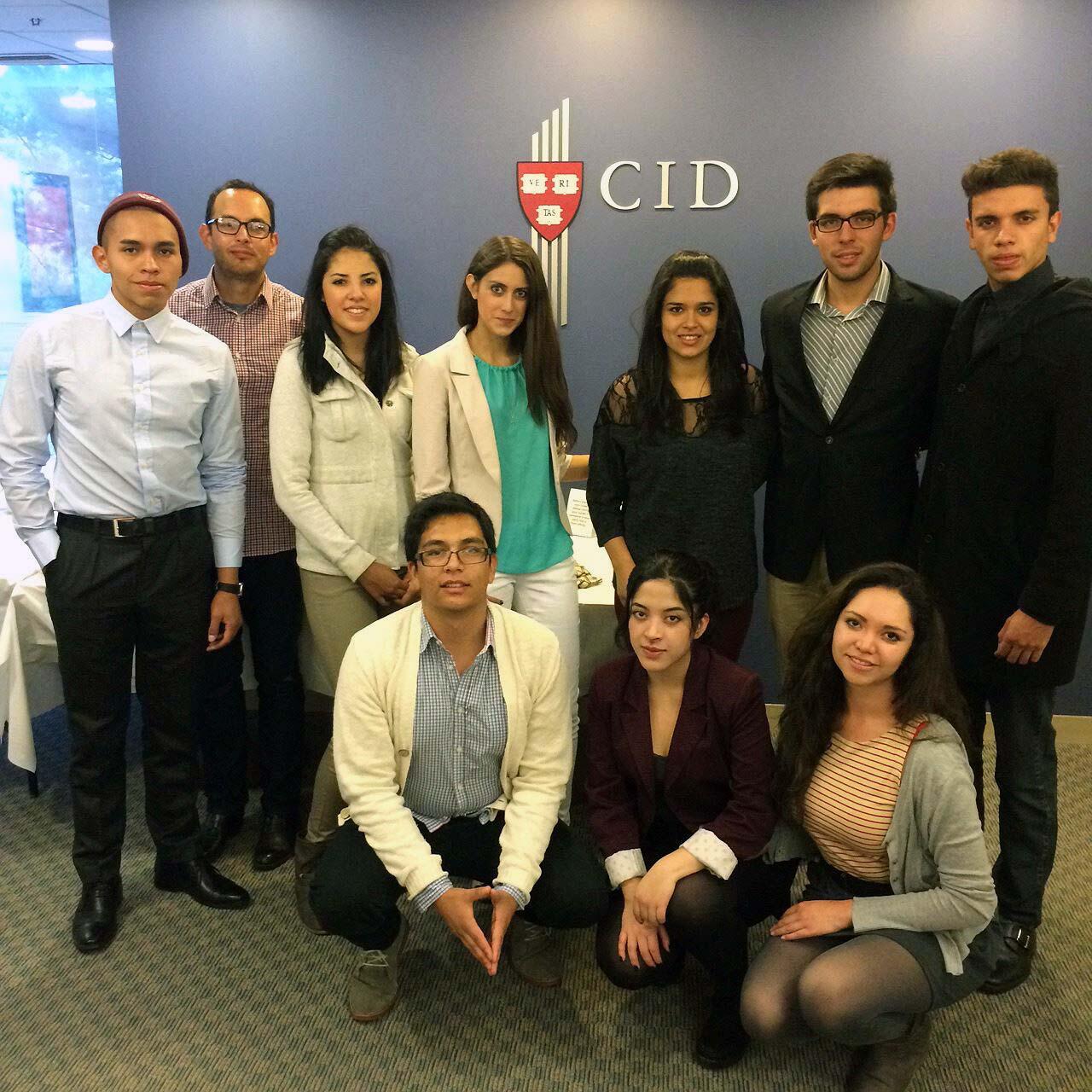Planting seeds for public policy
A nearly thirty-year collaboration between Harvard and Bolivia bears fruit amid COVID-19 and economic crisis.
By Greg Larson
The Growth Lab at Harvard’s Center for International Development conducts path-breaking research into the nature of economic growth, then translates those insights into real-world impact by engaging with policymakers in developing countries around the globe. But as a small think tank with limited staff and resources, maintaining meaningful connections in so many places at once can be challenging.
For nearly three decades, however, a little-known but deep-rooted collaboration in Bolivia has thrived through an alternative approach: supporting the development of homegrown public policy and research programs that share the Growth Lab’s mission – and can extend its impact through joint research and knowledge exchange.
Established in 1994, the Masters Programs for Development (MpD) at the Catholic University of Bolivia – the country’s first-ever public policy graduate program – resulted from years of collaboration between Harvard researchers, USAID, and Harvard-educated Bolivians. Since its founding, more than 1,400 Bolivians have graduated from the MpD’s programs in public policy, finance, and business administration, and its alumni and faculty have made important contributions to Bolivia’s economic growth story.
"The program transformed Bolivian education, creating a space to train future leaders in the public and private sectors," said Gonzalo Chavez Alvarez, who helped establish the MpD and is now Director of the School of Production and Competitiveness, of which it is part. "The change was really radical at the time, and the impact has been huge."
The Growth Lab and the MpD's relationship has deepened in recent years, even as Bolivia has undergone economic and political upheavals. Their faculties and staff collaborate frequently on teaching methods, economic research, or – most recently – online learning tools during the pandemic. But rather than a one-way transfer of resources and knowledge, the relationship is marked by shared learning and reciprocity.

"The program transformed Bolivian education, creating a space to train
future leaders in the public and private sectors."
Gonzalo Chavez Alvarez
The origin
In the early 1990s, Kennedy School lecturers and researchers Merilee Grindle, Mary Hilderbrand, and John Thomas noticed a global challenge: many developing countries with weak public institutions also had weak higher education systems. Even in places with large universities and technical schools, there were few pipelines for training policymakers.
"The Kennedy School has an exceptional model for professional education in public service," said Grindle. "We believed it could be adapted to conditions in many developing countries to strengthen the professional basis of governance and policy under often extremely difficult conditions."
The Kennedy School launched similar collaborations with educational institutions in Singapore, Mexico, and Vietnam – crafting locally-relevant programs adapted to existing realities, to help develop each country’s own indigenous capacity for public policy education.
In Bolivia, the need was clear: after decades of dictatorships and economic mismanagement, democracy had taken hold and the government was making significant reforms. The Harvard team worked closely with Bolivian colleagues – namely Chavez Alvarez and Marco Antonio Fernández – to lay the MpD’s foundations, collaborating on curriculum design, research methods, and pedagogy.
In the decades since, the program’s alumni, faculty, and affiliates have reached prominent positions in Bolivian government – including Juan Antonio Morales, who served as Bolivia’s central bank governor from 1995 to 2006 and hired many MpD graduates. Today, alumni are in leading roles across Bolivia’s public sector and in politics, academia, business, finance, and civil society.
"The program has had a substantial impact on all areas of Bolivian society," said Hilderbrand. "The Kennedy School philosophy was integrated into the program's development – those intellectual connections have continued, and will continue, to live on."

July 2019: Miners in Potosi, Bolívia | Photo by Pedro Henrique Santos on Unsplash
Understanding – and addressing – Bolivia’s growth challenges
In recent years, the Growth Lab’s work with the MpD has emphasized joint research and knowledge exchange. Until COVID-19, Bolivian faculty took annual trips to Cambridge to meet with faculty and staff, visit classes, attend the Growth Lab’s Harvard Executive Education course, and participate in workshops and seminars across the university. Inspired by and in collaboration with the Harvard i-Lab, for example, the MpD is currently developing its own innovation hub and entrepreneurship accelerator.
Over the years, Growth Lab and MpD researchers have conducted joint analysis and Kennedy School students, faculty, and leadership have visited La Paz – including Marcela Escobari, a Bolivia native and former executive director of Harvard’s Center for International Development who now serves as USAID'S Assistant Administrator for Latin America and the Caribbean. In 2019, a group from Harvard – including Levy and Grindle – traveled to Bolivia for the collaboration’s 25th anniversary.
Despite the collaboration's success, the last three decades in Bolivia have been challenging. Periods of high growth helped reduce poverty and inequality, but the economy's dependence on fossil fuels leads to boom-bust cycles, often accompanied by political crisis. Protests in 2019 forced President Evo Morales to resign, followed by a chaotic period of uncertainty – during which COVID-19 hit. More than 21,000 Bolivians have died from the virus and the pandemic has decimated government finances, with Bolivia’s economy undergoing its worst recession since the 1980s.
Amid these challenges, the Growth Lab’s collaboration with the MpD has continued to thrive. Early on in the pandemic, led by Levy – who in 2020 published a guidebook on teaching with Zoom – the Growth Lab supported the MpD’s transition to remote education, including rapid adoption of online teaching tools and new approaches to pedagogy. Frequently, the learnings go both ways.
"The Bolivians are incredibly creative and entrepreneurial,” said Levy. “They created online offerings at a fraction of the cost that US universities pay. I’ve learned a ton from them – in terms of how to do things more quickly and efficiently, and how technology can be deployed for learning."
"I’ve learned a ton from them – in terms of how to do things more quickly and efficiently,
and how technology can be deployed for learning."
Dan Levy
The two institutions also jointly conducted a Growth Diagnostic – a pioneering methodology developed by the Growth Lab – to analyze the Bolivian economy and identify key constraints and opportunities for sustainable growth. Using Growth Lab tools for economic complexity analysis, the report – co-authored by David Zavaleta, an MpD professor and director, the Growth Lab’s Tim Cheston, and Kennedy School student Randy Kotti – underscores the urgent need for diversification, identifies promising sectors for development, and offers recommendations for managing the tightrope between economic stimulus and macroeconomic stability.
"It is hard to overestimate the importance of the long-term collaboration we have had with our Bolivian colleagues at MpD," said Ricardo Hausmann, director of the Growth Lab and Rafik Hariri Professor of the Practice of International Political Economy at HKS. "From the challenges of diversifying a commodity-driven economy to COVID-19 policy response, I have always appreciated the benefits of thinking together over these hard issues."
Zavaleta sees the pandemic as a turning point – and the MpD’s collaboration with the Growth Lab as a valuable resource for ideas and motivation.
"It gives us hope that we can find new ways to manage and deal with the challenges ahead," he said. "The pandemic brought huge difficulties, but it also forced some positive changes – like increased technological transformation, in the health and education sectors. Now, we must recover what we’ve lost – without losing what we have learned."